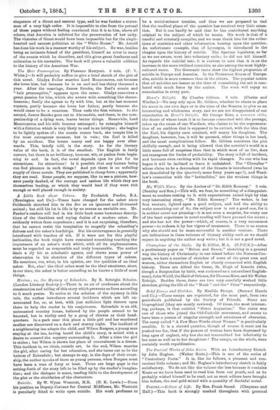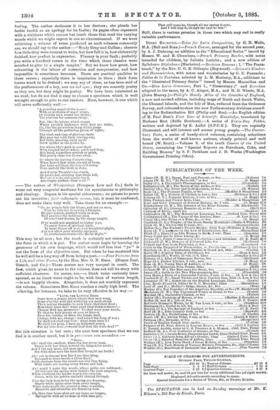POETRY.—Echoes of Life. By Mrs. Frank Snoad. (Chapman and Hall.)—This
book is strongly marked throughout with Rersonal
feeling. The author dedicates it to her doctors ; she pleads her feeble health as an apology for its faults ; its pages often represent with a vividness which cannot but touch those that read the varying moods which we might expect in one so circumstanced. If we were criticising a volume of verse produced as such volumes commonly
are, we should say to the author Study Gray and Collins ; observe how little they were content to write, but how full it is, how elaborately finished, how perfect in expression. Fluency is your fault ; probably you write a hundred verses in the time which these classics were satisfied to give to a single couplet.' But we know how great, how exhausting is the labour of correction and compression, and how impossible it sometimes becomes. There are poetical qualities in these verses ; especially there is inspiration in them ; their form leaves mach to be desired ; we may say of them, as has been said of the performance of a boy, non res sed apes ; they are scarcely poetry as they are, but they might be poetry. We have been interested as we read, but do not find it easy to choose a specimen which is well wrought enough to give to our readers. Here, however, is one which will serve sufficiently well :—
" A guardian angel of the house! With no pretence of angel wings, Cr shining halo round her brows ; Too glorious for common things.
But, like the briefly which creeps Where parch'd highways with dust are white, Or, like the glowworm lamp which peeps Through all the gathering gloom of night;
The clash and ring of glorious deeds May pass her with their stirring cry, But little, pressing, daily needs Grow lighter as she passes by.
For where life's path is over-thick With tangled briars which catch and fray, Her hand, regardless scratch or prick, Will gently clear the thorns away.
Or where the jarring discords ring, When Love's best notes are out of tune, tier hand will from the loosen'd string Coax melody like birds in Jute.
And if grim Trouble's icy clutch, Or pain's hot, scathing tear-drops fall, Her geist voice and gentle touch Are simply perfect—that is all !"
— The author of Whisperings (Sampson Low and Co.) finds in verse not very congenial mediums for his speculations in philosophy and theology. Dogma is his special abhorrence ; on priests be pours out his invective ; faeit indignatio versus, but, it mast be confessed, does not make them very well. Take these for an example :—
" On ye priests falls the blame, and not on man, That he lists nut to suiritu il thought. He uses reason, garbled truth to scan, Well analyses the fictitious plan Of creed and dogma, by the clergy taught.
If ye would win mankind to higher joys, To purer limes of spiritual light, Ye must throw off your own benighted plight, And not allow your worldly equipoise To overbalance truth—the Moral Right."
This may be all trim; but the truth is certainly not commended by the form in which it is put. The author must begin by learning the grammar of his own language, which would tell him that " ye " is not the form of the objective case. Bat when he has mastered this he will still be a berg way off from being a poet.—Four Pictures from a Life, and other Poems, by the Hon. Mrs. 0. N. Knox. (Kegan Paul, Trench, and Co.)—These poems are very unequal in merit. The first, which gives its name to the volume, does not tell its story with sufficient clearness. Its metre, too,—a blank verse curiously inter- spersed, as no blank verse ought to be, with lines of various length, —is not happily chosen. Altogether, it does not worthily represent the volume. Sometimes Mrs. Knox reaches a really high level. The (Mowing, for instance, we take to be very effective in its way :— " Lova, THE LOWEST DEEP.
Some have a grassy grave where they may weep, Some o'er the wild and wildering sea must strain Their aching thoughts to seek their cherished dead ; How their tears fall! what grief they think is theirs!— Change with me, mourners ! Ye that wear your weeds, Ye that by holy graves or seen or known Pray for, invoke, or bless the happy dead, Change with me. change ! and sound the deep of woe ; Ye shell not shed one tear: what tears have I Ye shall not pray, I have no hallowed grave, For my love lives ;—would God that she were dead I"
But this elevation is bat rare ; the next best specimen that we can find is in another mood, but it is proxitnum non secundum :— " SONG.
Oh! shall the swallow, when the day grows long. Sweep with her wings toward the longed-for north ; And I not any more, not once again,
See with mine eyes the laud that brought me forth P
Ah ! yet in dreams how fair I see thee lying,
Bosomed in trees beside a silver flood; Swift shadows from the clouds are o'er thee flying,
Wild winds are wooing every flower and bud.
Ah ! could I paint thy woods, whose paths are reddened ; All through the spring with sheaths the buds outgrew, While overhead the tender leaves are swaying,
Green, with the golden sunlight shining through.
E'en the dark laurels for the spring are dressing, Starry white spires arise from every bough, While underneath the ground is blue, is golden, Hyacinth and celandine are blooming now.
Oh, then dear home that art my home no longer, Springtide with all its hope is with thee yet;
That still remains, though all my spring is over, And I will sing it, though my eyes be wet."
Still, there is various promise in these two which may end in really valuable performance.















































 Previous page
Previous page